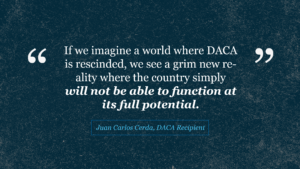Dallas knows the value of immigrants. Our area is home to nearly 35,000 immigrant “Dreamers” who were brought to this country as children. Many have been on the front lines in these unprecedented times.
But for President Trump, our lives — and the Deferred Action for Childhood Arrivals (DACA) program that protects us from deportation and allows us to work and study — have become nothing more than a political bargaining chip.
Despite a June victory for DACA recipients at the Supreme Court, the president is refusing to fully reinstate the program: The administration announced shortly after that it would not accept new applications, will require costly renewals yearly instead of every other year, and is leaving the door wide open to rescind DACA once again.
This doesn’t make any sense. Especially here in Texas.
Immigrants in Dallas and across the state contribute hundreds of millions of dollars to the Texas economy, and polls show that an overwhelming majority of Texans, including a majority of Republicans, support a pathway to citizenship for Dreamers.
Dreamers’ potential to contribute to Texas and the U.S. goes beyond those of us who are eligible for DACA.
The morning the U.S. Supreme Court ruled that the administration had rescinded DACA improperly, I watched undocumented young people on TV triumphantly celebrate the decision that, for now, preserves the program that they had fought for eight years ago.
Messages of support and congratulations flooded my phone that morning: “We won!” “You deserve it!” “This is the best news you could have received!” But the message that stuck out to me was: “Do you know if DACA is taking new applications and if I can apply?”

It was a message from a 17-year-old Dallas high school student who I mentor. He is undocumented, and arrived in the United States when he was 7 years old — the same age I was when I was brought here. But because he arrived in 2010, three years after the 2007 cutoff date for DACA, he is not eligible for the program and cannot legally work or drive. He does not have any protection from deportation, much less any hope of an eventual legal pathway to citizenship.
Were he to drive, he could get pulled over, questioned about his immigration status, and arrested for failing to have a driver’s license — something that he cannot obtain. Imagine where life could lead him if he didn’t have the constant threat of deportation and financial insecurity hanging over his head.
His struggles are personal for me as well. DACA allowed me to get my first job as a student at Yale, my first driver’s license and first car, and the chance to study abroad and see the world. The program made it possible to start my career as a kindergarten teacher and community organizer in Dallas. Next year, God willing, I will marry the love of my life — a DACA recipient like me — own a home, and start a family right here in the community. Though it is not a permanent program, DACA gave me some certainty to live my life, and my mentee would be grateful for the same chance to pursue his dreams.
The program’s uncertain future is not just President Trump’s fault. Congress, including members of our state’s congressional delegation, need to step up to protect immigrants in Texas, which has the second largest population of DACA recipients in the country.
If we imagine a world where DACA is rescinded, we see a grim new reality where the country simply will not be able to function at its full potential. Industries will struggle, businesses will close, and local tax revenues will fall. There will be a chain reaction in Dallas and throughout the state that will hit every corner of Texans’ lives.
That’s why we need permanent legislation that provides us with a pathway to legal residency and citizenship. We need legislation like South Carolina Republican Sen. Lindsey Graham’s Dream Act or the American Dream and Promise Act.
With every passing day that legislation is delayed, and with the Trump administration showing no mercy, we risk losing more of our neighbors to deportation and denying our community of their rich contributions.
Juan Carlos Cerda is the DFW Business Outreach Manager at the Texas Business Immigration Coalition.

